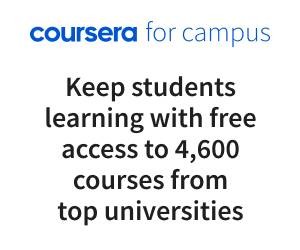By providing quality blended learning, higher education institutions in Oman can help close the skills gap with employers
Round table held in November 2021.
As blended learning becomes increasingly popular – and necessary – higher education institutes in Oman have an opportunity to utlilise blended learning to increase graduate employability. Quality skills education is a key part of achieving this, but it presents cultural and technological barriers that institutions must overcome.
Leaders from education and industry gathered at a Times Higher Education round table, held in partnership with Coursera for Campus, to discuss these barriers and how they are being overcome to give way to a blended learning model that delivers the skills being demanded by employers.
Kiran Gopakumar, dean of Middle East College, explained that the move to digital delivery was eased by the fact that his institution had adopted Moocs and technologies to promote lifelong learning before the pandemic struck.
Now, as campuses reopen, hybrid models are proving effective. A “hyflex” model comprising parallel online and face-to-face sessions and recorded sessions is being used at Middle East College, Gopakumar said.
Armin Eberlein, deputy rector for academic affairs at the German University of Technology in Oman (Gutech), described a model of alternating online and in-person teaching days. This worked well for students but not for some faculty, he said.
Hussein Abdulqader, dean of the college of engineering and architecture at the University of Nizwa, said his institution used a 75 per cent on-campus, 25 per cent online approach, with high-capacity courses delivered online but all assessments taken on-campus. Students were also required to attend one lecture a fortnight online to maintain preparedness. “We didn’t want to lose the experience gained how to manage the platform and the technology,” Abdulqader said.
Fouad Chedid, vice-chancellor of A’Sharqiyah University, spoke about the importance of retaining some level of digital delivery. “All the additional skills that students were equipped with…online is an approach that should stay irrespective of the pandemic,” he said. A’Sharqiyah is now offering additional digital skills training to students. “This is what employers want to see,” Chedid said.
Zaher Srour, partnerships director at Coursera, agreed that online was good for boosting employability and soft skills – for faculty as well as students. “I hear that many in Oman want to keep [digital learning] active, especially for emerging skills that universities are not used to teaching.
GUtech had begun trialling Coursera courses, said Eberlein, blending these with traditional courses, and offering “more and more” skills training.
The panellists agreed that there was a blended future for lifelong learning and employability skills. Alumni are asking that graduates be trained in these areas, Abdulqader said.
For Gopakumar, it was a matter of combining the strengths of online and face-to-face. “With soft skills, many of our students who would otherwise have trouble speaking in front of class are doing extremely well on the online platform. They have gained some confidence,” he said. A flexible model was important, and online offered many opportunities to a diverse range of students.
“Blending is about blending the advantages…There are aspects where students have gained substantially, but the social aspects have suffered…The question is not ‘X or Y’, but how we combine X and Y to best advantage,” Gopakumar said.
A blended learning model also offered competitive advantages to Oman’s education sector. “We have to be aware that online is picking up across the world. The competition has changed from regional to international due to online offerings by leading institutions across the world,” Gopakumar said.
This was not about incremental change, but “drastic change… We have to change the very structure”. While Oman faced many challenges, it had an advantage in that the sector was relatively new. “This makes a structural shift easy.”
The panel:
- Dr Hussein Abdulqader, dean of the college of engineering and architecture, University of Nizwa
- Dr Fouad Chedid, vice-chancellor, A’Sharqiyah University
- Dr Armin Eberlein, deputy rector for academic affairs, Gutech - German University of Technology in Oman
- Dr Kiran Gopakumar, dean, Middle East College
- Alistair Lawrence, special projects editor, Times Higher Education (chair)
- Zaher Srour, partnerships director, Coursera
Watch the round table on demand above or on the THE Connect YouTube channel.
Find out more about Coursera for Campus.










































































